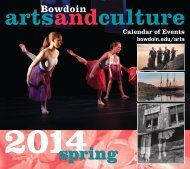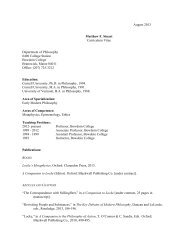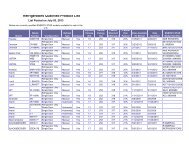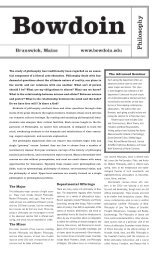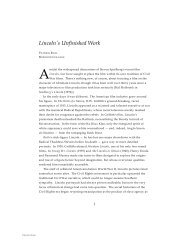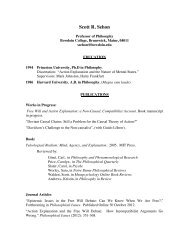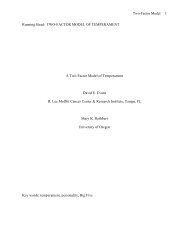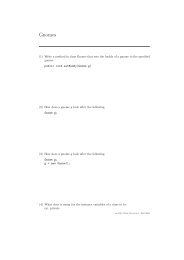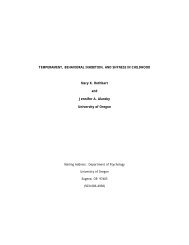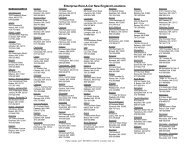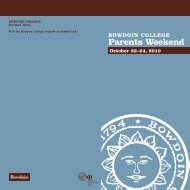Bowdoin Narrative Film Syllabus - Bowdoin College
Bowdoin Narrative Film Syllabus - Bowdoin College
Bowdoin Narrative Film Syllabus - Bowdoin College
You also want an ePaper? Increase the reach of your titles
YUMPU automatically turns print PDFs into web optimized ePapers that Google loves.
FILM STUDIES 101: <strong>Film</strong> <strong>Narrative</strong><br />
T/TH 11:30am – 12:55pm<br />
Sarah Childress<br />
Email: schildre@bowdoin.edu<br />
Office: 116 Sills Hall Office Hours: T/TH 1pm – 2:30pm<br />
Required Texts<br />
David Bordwell and Kristin Thompson, <strong>Film</strong> Art, 8 th ed.<br />
Timothy Corrigan, A Short Guide to Writing About <strong>Film</strong> (any Used edition will work)<br />
Tom Schroeppel, The Bare Bones Camera Course for <strong>Film</strong> and Video<br />
Other required readings will be available via the course website as electronic resources<br />
General Notes About the Course:<br />
1. This course requires you to view films outside of class time each week. <strong>Film</strong> screenings are<br />
mandatory. You will be required to see one film each week, but you will have two viewing options:<br />
Tuesdays at 6pm and Wednesdays at 8:30pm in Sills Smith Auditorium. If you would like to review the<br />
film, the DVD will be on reserve at the Media Center when possible.<br />
2. Readings should be prepared for the day on which they appear on the calendar. Please bring the<br />
reading(s) to class. As you read, mark your text with notes to yourself: indicate points that seem<br />
important, note examples from your viewing experiences, and jot down questions. Please come to class<br />
ready to discuss and ask questions. I will lecture in this course, but this will be a discussion-oriented<br />
class. Your questions and ideas matter, so please bring them with you to class.<br />
3. Take notes on every film you watch for this course. When watching the films, I’d recommend you<br />
pay attention to the topic we’re focusing on for that week to guide your note taking and analysis. As<br />
the film is running, jot down specific details or ideas that occur to you. After the film is over, I’d<br />
suggest you take 5 minutes to note any theme(s) the film brings up or to write down questions about<br />
the film. Trust me, specific details from the films and your initial ideas about them will begin to<br />
evaporate as soon as you walk out of the screening room. These notes will be helpful when you sit<br />
down to develop your written analyses and interpretations. In addition to giving you a head start on<br />
your papers, the notes will also help you study for quizzes, the midterm, and the final.<br />
Course overview<br />
Visual narratives have increasingly defined cultural values, opinions, and beliefs but we often don’t think<br />
about examining films in the same way we do other narrative arts or mass communication forms. This<br />
course will introduce you to the language of film and to the critical tools used to investigate how that<br />
language creates narratives with particular resonances. We will focus on the techniques formulated to<br />
exploit the possibilities inherent within the film medium in order to learn how to interpret films.<br />
Specifically, we will examine the visual, aural, and narrative conventions motion pictures employ to<br />
participate in or comment upon significant social and cultural experiences. I also hope to encourage you to<br />
be more critically aware of how films contribute to defining social norms and how certain filmmakers<br />
attempt to intervene in that process through their films. We will consider each film to be a system, with<br />
internal parts that interact with one another to generate the film’s themes and commentaries. We<br />
will use the principles of film form and the four sets of cinematic techniques – mise-en-scène,<br />
cinematography, editing, and sound – as tools to analyze individual narrative films. You will also practice<br />
using these skills to construct unique, contentious, and supported arguments about these films, both in<br />
class discussions and in your writing.
Notes on Grading<br />
Quizzes<br />
Quizzes will be unannounced and cannot be made up so please be sure to prepare for each class by<br />
completing and thinking about the readings assigned for that day and by attending that week’s screening.<br />
Papers<br />
Response Papers<br />
After each film screening, I would like you to write a 250-word essay – no more, no less – that responds<br />
to the film. Each essay should include a thesis that is proven through analysis that focuses on our topic/<br />
tool for that week. These papers are due in class each Thursday. The intent of these papers is: 1) to jump<br />
start your thought process so you will be ready to participate in our class discussions about the film and 2)<br />
to provide a foundation for your long-form papers. These papers will receive a grade based on the<br />
insightfulness of the thesis and how well you support that thesis through analysis. These papers are meant<br />
to be thought-starters not end products so please make them short and sweet by focusing on ONE thematic<br />
element and analyzing how ONE formal element works in ONE scene to develop that theme.<br />
Long-form Papers<br />
This course requires three analytical essays. In Paper 1, you will complete a detailed segmentation of a<br />
sequence from one of our assigned films. In Paper 2, you will investigate how mise-en-scène contributes<br />
to the development of a theme. And in Paper 3, I will ask you to analyze one of our films using at least<br />
three of the formal properties we have studied. You will only be writing on films screened for this class.<br />
I do not accept late work except in the case of holidays or documented medical or family emergencies.<br />
For each 24 hours a paper is late, 1/3 letter grade will be deducted.<br />
Midterm and Final Exams<br />
The midterm will cover the films and concepts we have studied up to that point. The midterm will take<br />
place over two class periods. The first part (on Tues) will include T/F, multiple choice, and short essay<br />
questions. The second part (on Thurs) will ask you to write brief essays in which you analyze 3 clips.<br />
The final will assess your accumulated knowledge regarding: 1) the tools, skill, and vocabulary required<br />
for film analysis, 2) your understanding of the assigned readings, and 3) your visual analytical prowess. It<br />
will also consist of multiple choice and T/F questions, short essay responses, and clip analysis.<br />
Participation<br />
Participation is crucial to learning and will thus be graded. Your response papers will count for most of<br />
this grade, but I will also take into account your in-class participation and attendance. You will have two<br />
“free passes” for unexcused absences, but after that, each unexcused absence will result in a ½-letter grade<br />
deduction from your course average (i.e., if your average is 94, your third unexcused absence will knock it<br />
down to a 90, the fourth to an 85, etc.). <strong>College</strong>-approved holidays count as excused absences, but leaving<br />
early for holiday breaks or for games/team travel will not constitute excused absences.<br />
Grade Breakdown:<br />
Quizzes 5%<br />
Paper 1 (Segmentation) 10%<br />
Midterm 15%<br />
Paper 2 (Mise-en-scène) 15%<br />
Paper 3 (Formal analysis) 20%<br />
Final exam (cumulative) 20%<br />
Response Papers/Participation 15%<br />
2
______________~~ Course Calendar ~~______________<br />
Sept. 2: Course Introduction, Getting to Know You, Fun with <strong>Film</strong> Analysis<br />
Week 1: <strong>Film</strong> as Object of Academic Study<br />
Screening: The Bourne Ultimatum (Paul Greengrass, U.S., 2007, 115 min)<br />
What makes analytical writing different from film reviewing?<br />
Sept 7: Corrigan, A Short Guide to Writing About <strong>Film</strong> Chapters 1, 2, and 4; <strong>Film</strong> Art 431-434<br />
Hand out review vs. analysis assignment (counts as response paper)<br />
Sept 9 (Rosh Hashanah): <strong>Film</strong> Art 53-73, 384-410, Corrigan Chapter 3<br />
Review vs. analysis assignment due* (*holiday extensions available, please contact me for extension)<br />
Week 2: Architectures of <strong>Narrative</strong><br />
Screening: Hiroshima, mon amour (Alain Resnais, France/Japan, 1959, 90 min)<br />
Sept 14: <strong>Film</strong> Art 74-88, 304-309, and “Story Causality and Motivation” from The Classical Hollywood<br />
Cinema (electronic resource)<br />
Sept 16: “Hiroshima, mon amour: The Twitching Hands” from How Movies Work (electronic resource);<br />
response paper due<br />
Week 3: Perspectives of Narration<br />
Screening: The Usual Suspects (Bryan Singer, U.S., 1995, 106 min)<br />
Sept 21: <strong>Film</strong> Art 88-96; “Writing the New Noir <strong>Film</strong>” (electronic resource)<br />
Paper 1 due: Segmentation of Hiroshima, mon amour<br />
Sept 23: “Rounding up The Usual Suspects: The Comforts of Character and Neo-Noir” (electronic<br />
resource); response paper due<br />
Week 4: Mise-en-scène: The world before the camera<br />
Screening: The Searchers (John Ford, U.S., 1956, 119 min)<br />
Sept 28: <strong>Film</strong> Art 112-153, Bare Bones Ch. 7 [Recommended: <strong>Film</strong> Art 153-161]; Paper 1 assignment<br />
Sept 30: Corrigan Ch. 5 and “Main Critical Issues in The Searchers” (electronic resource)<br />
[Recommended: “The Searchers: An American Dilemma” (electronic resource)]; response paper due<br />
Week 5: Cinematography: The Power of Framing to Create Meaning<br />
Screening: La Mujer Sin Cabeza (The Headless Woman, Lucrecia Martel, Argentina, 2008, 87 min)<br />
Oct 5: <strong>Film</strong> Art 162-194, Bare Bones Chapter 1<br />
Oct 7: Bare Bones Chapters 2, 3, 5; online interview with Lucrecia Martel<br />
(http://www.reverseshot.com/article/interview_lucrecia_martel); response paper due<br />
Paper 2 due in class: Mise-en-scene in The Searchers<br />
3
Week 6: Cinematography: Deep space, mobile framing, and the long take<br />
Screening: Punch-drunk Love (Paul Thomas Anderson, U.S., 2002, 95 min)<br />
Oct 12: Fall Vacation<br />
Oct 14: <strong>Film</strong> Art 195-217; response paper due<br />
Week 7: MIDTERM<br />
Screening: Midterm clip reel (three film clips that you will be asked to analyze for Part 2)<br />
Oct 19: Midterm Part 1 (T/F, multiple choice, short answer)<br />
Oct. 21: Midterm Part 2 (Clip analysis)<br />
Week 8: Editing: Stitching together time, space, and meaning<br />
Screening: Strangers on a Train (Alfred Hitchcock, U.S., 1951, 101 min)<br />
Oct 26: <strong>Film</strong> Art 218 – 231<br />
Oct 28: Robin Wood, “Strangers on a Train” (electronic resource); response paper due<br />
Week 9: The Continuity System of Editing<br />
Screening: The Maltese Falcon (John Huston, US, 1941, 100 min)<br />
Nov 2: <strong>Film</strong> Art 231-251, 440-447, Bare Bones Ch. 4; “Visual Motifs of <strong>Film</strong> Noir” (electronic resource)<br />
Nov 4: William Luhr, “Tracking The Maltese Falcon” (electronic resource) [Recommended: Paul<br />
Schrader “Notes on <strong>Film</strong> Noir” (electronic response)]; response paper due<br />
Week 10: Alternatives to Continuity<br />
Screening: October (S.M. Eisenstein, Soviet Union, 1928, 103 min)<br />
Nov 9: <strong>Film</strong> Art 251-263, 453-456; “October” from How Movies Work (electronic resource); and John<br />
Reed, Ten Days That Shook the World, Chapter 1:<br />
http://www.marxists.org/archive/reed/1919/10days/10days/ch1.htm<br />
Paper 3 assignment<br />
Nov 11: Murray Sperber, “Eisenstein’s October” in Jump Cut online:<br />
http://www.ejumpcut.org/archive/onlinessays/JC14folder/October.html<br />
Response paper due<br />
4
Week 11: Sound: The noisy silent partner in filmic meaning<br />
Screening: The Conversation (Francis Ford Coppola, US, 1974, 113 min)<br />
Nov 16: <strong>Film</strong> Art 264-292, 456-459, Dennis Turner, “The Subject of The Conversation” (electronic<br />
resource), [Recommended: <strong>Film</strong> Art 293-303]<br />
Nov 18: Class Cancelled; 2-page response paper due by 1pm today on The Conversation via<br />
Digital Dropbox<br />
Week 12: Thanksgiving Holiday<br />
Screening: No screening this week<br />
Nov 23: Corrigan Chapter 6, discussion/workshop on Paper 3<br />
Nov 25: Thanksgiving Holiday<br />
Week 13: Genre and other contexts of cinematic meaning<br />
Screening: Limonádový Joe aneb Konská opera (Lemonade Joe, or Horse Opera, Oldrich Lipský,<br />
Czechoslovakia, 1964, 99 min)<br />
Nov 30: <strong>Film</strong> Art 318-332 and Rick Altman “What is generally understood by the notion of film genre?”<br />
(electronic resource)<br />
Dec 2: Peter Bischoff “Limonádový Joe; or, the Western in Czechoslovakia” (electronic resource)<br />
Paper 3 due: Formal analysis<br />
Week 14: Self-reflexivity: <strong>Film</strong>s about <strong>Film</strong>(-making)<br />
Screening: 8 ½ (Federico Fellini, Italy/France, 1963. 138 min)<br />
Dec 7: Marilyn Fabe “The European Art <strong>Film</strong>: Federico Fellini’s 8 ½” (electronic resource)<br />
Dec 9: Last day of class; Review day. Bring at least one question to class (for 3 extra points on lowest<br />
quiz grade)<br />
Final Exam: Time/date TBD by Registrar<br />
5



